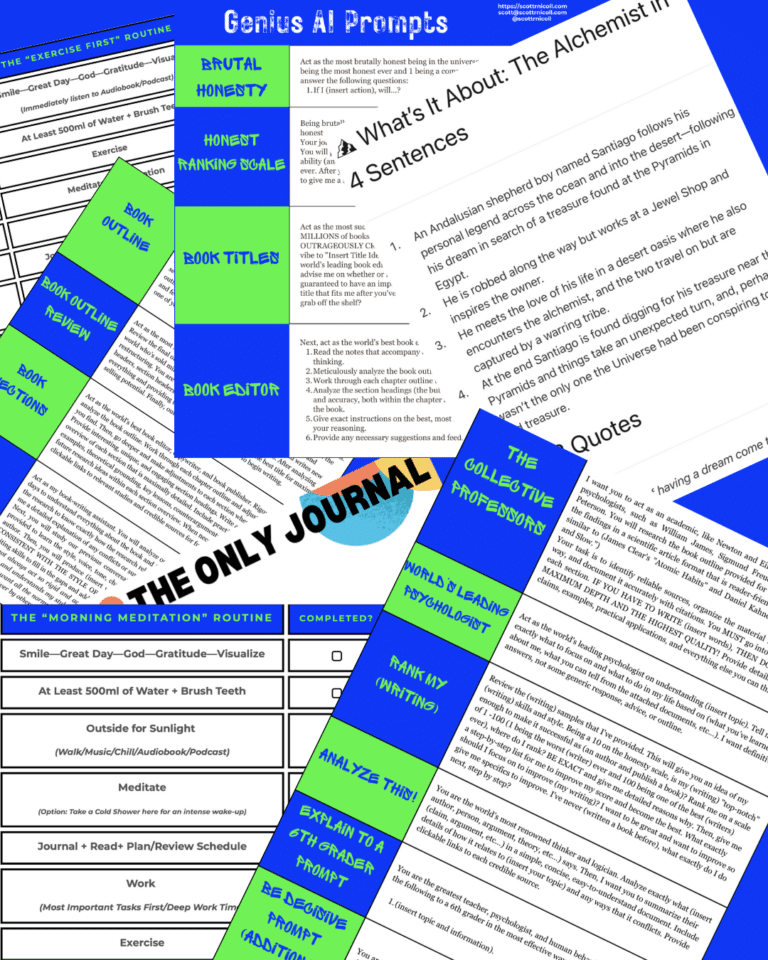The Benefits of Journaling
Journaling: More Than Just Writing—A Tool for Growth and Clarity
Journaling is everywhere these days—social media, self-improvement books, morning routine guides—but does it actually work? More importantly, how do you make it work for you?
1. Why Journaling? The Science Behind It
It’s not just about venting or recording your day. Journaling has real cognitive and emotional benefits backed by research:
- Processing emotions – Helps you manage negative emotions and gain clarity.
- Enhancing memory and learning – The act of writing (rather than typing) creates a stronger imprint in the brain.
- Encouraging deeper thinking – Used by historical figures like Marcus Aurelius, Benjamin Franklin, and Charles Darwin as a tool for problem-solving and personal growth.
When you journal, you’re actively shaping your thoughts, emotions, and self-awareness in a way that can impact all areas of life.
2. Different Journaling Styles—Finding What Works for You
There’s no “one right way” to journal—it’s about finding the method that fits your needs and lifestyle.
The Technician (Digital Journaling)
- Uses apps or notes on their phone.
- Efficient and searchable but can be distracting.
The Creative (Visual & Freeform Journaling)
- Uses a blank page as a canvas, incorporating sketches, mind maps, or even collages.
- Engages different parts of the brain, making the experience deeper and more interactive.
The Overthinker (Brain Dump & Morning Pages)
- Just get words onto the page, no judgment, no censoring.
- Julia Cameron’s Morning Pages suggests writing three full pages of stream-of-consciousness thoughts.
- A great tool for clearing mental clutter.
The Strategist (Structured Journaling with Prompts)
- Uses a guided journal (like the Only Journal template) with a mix of techniques.
- Provides structure without feeling rigid.
- Good for people who want direction but don’t want to overthink their journaling practice.
3. The Key to Success: Plan to Fail (Yes, Really)
Many people struggle with consistency when starting a journaling habit. The trick? Don’t aim for perfection—plan for breaks.
- Schedule “off days” to prevent burnout.
- Start small – Instead of daily journaling, begin with 1-2 sessions per week.
- Treat it like a workout – Just like rest days in fitness, occasional breaks help sustain long-term commitment.
Journaling should feel like a tool for growth, not a chore.
4. The Bigger Picture—Why This Actually Matters
Journaling isn’t just about writing—it’s about self-discovery, clarity, and intentional living.
- It helps you hit “pause” on autopilot thinking – A chance to check in with yourself.
- Improves decision-making – By reflecting, you see patterns in your thoughts and behaviors.
- Boosts communication skills – Processing emotions and thoughts on paper makes expressing them in conversations easier.
- Strengthens emotional intelligence – The more you understand yourself, the more you understand others.
5. How to Get Started—Simple Steps
- Choose your style – Are you a digital person, a free-flowing writer, or someone who needs structure?
- Set realistic expectations – Start small, plan for breaks, and remove the pressure of perfection.
- Experiment – Try different approaches and adjust based on what feels natural.
- Use prompts if needed – Questions like “What am I grateful for?” or “What’s on my mind right now?” can help spark ideas.
- Make it enjoyable – Find a quiet place, grab your favorite pen, and make it a ritual you look forward to.
Final Thought: Just Start
Journaling is not about “doing it right.” It’s about understanding yourself better, one entry at a time. Whether you write daily, weekly, or just when you need clarity, it’s a practice that can transform the way you think and live.
So grab a pen, open a document, and just start. Happy writing!
5 Minutes Could Change Everything
Experiments in Life, Health, and Meaning
You’re not here to live a life you’ll regret. Neither am I.
Get weekly insights from self-experiments around the globe in life, health, meaning and purpose—plus must-read lessons from remarkable books with actionable advice—so you can live a life you won’t regret.
No spam. Ever. Bad jokes. Often. Opt out anytime.








